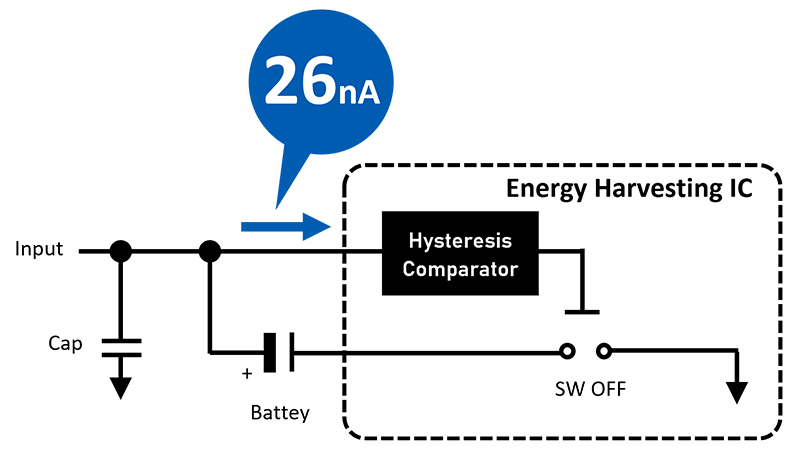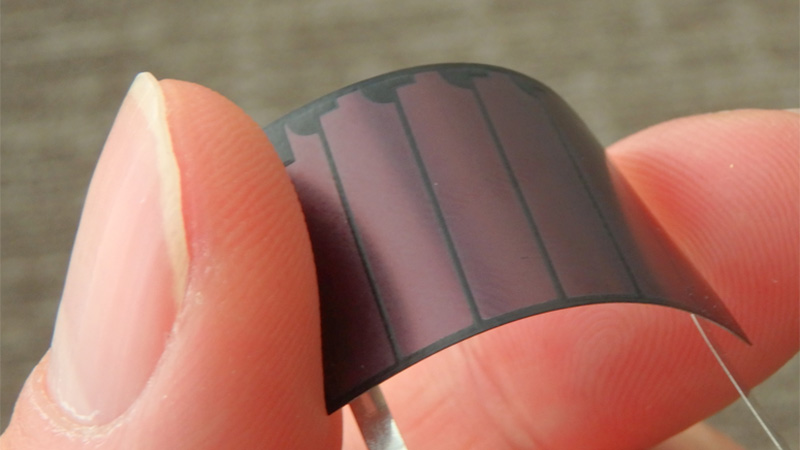What makes AKM different ?
Energy Harvesting
As sensors and IoT devices continue to become smaller and more energy-efficient, the expectation for environmental power generation, known as energy harvesting, is rapidly increasing. However, in actual use, challenges such as unstable power generation, long startup times, and battery degradation during long-term storage often arise.
For its ultra-low quiescent current, AKM's energy harvesting IC enables stable operation of IoT devices even at micro-watt levels of generation. It delivers a high-performance and high-efficiency solution that overcomes the barriers to practical implementation.
System operation with quick charging
Major challenges for integrating renewable energy into daily life are the efficient storage of power and stable delivery. AKM’s energy harvesting IC achieves simultaneous direct power supply from environmental sources and charging of secondary batteries, enabling rapid system startup even from a fully discharged state. Furthermore, the energy harvesting IC operates in standby mode with only 52 nA*, minimizing power loss and protecting the system from over-discharge.
* Total 52nA achieved by using 2 channels of IC built-in comparator 26nA
Three Key Features of AKM’s Energy Harvesting IC
- Charge and discharge control with only 26 nA of the collected energy
- Short charging time even when the secondary battery is fully depleted
- Disconnects the load when the voltage drops to protect against over-discharge


Achieves both battery protection and extended lifespan
Sensors and devices are generally stored in factories or warehouses for exrtended periods before being put into practical use, which can cause issues such as over-discharge and performance degradation due to the battery's self-discharge.
AKM’s energy harvesting IC integrates two low-power comparators operating at just 26 nA each, allowing the protection against over-discharge and over-voltage with a total self-consumption current of only 52 nA. This ultra-low current operation keeps the battery safe even during long-term storage and enables the system to start up immediately after shipping. In addition, AKM offers product variations with multiple threshold settings, enabling flexible operation tailored to the characteristics of storage elements such as LICs (lithium-ion capacitors) and EDLCs (electric double-layer capacitors).

Multiplexing of power generation methods
Leveraging its proprietary circuit technology, AKM has integrated a boost converter that starts operating just at 15 mV and a charge/discharge control circuit that runs on only at 26 nA of collected energy into a single chip, achieving micro-watt-level power boosting. AKM also offers a wide range of product lineup compatible with various power sources such as bio batteries, microbial power generation, and thermoelectric elements. By combining with multi-cell solar panels (e.g., six cells), it enables multi-source power generation and stabilizes the voltage of storage devices.

Applications and Future Outlook
AKM’s energy harvesting technology is already being used in the following fields.
- Wearable devices and healthcare sensors where battery replacement is difficult
- Battery-free sensing for infrastructure inspection
- Low-power generation devices utilizing biological reactions
- Smart agriculture devices that require no maintenance for long periods
Demand for “battery-free” IoT devices is expected to grow even further in the future.
AKM will continue to advance its energy harvesting technology to meet these evolving needs.

Inquiries about Energy Harvesting
Please feel free to contact us.
- Purchase of products and samples
- Product specifications, technical details, product reference materials, and technical questions
- Introduction to distributors/representatives
- Compliance with Environmental Standards









